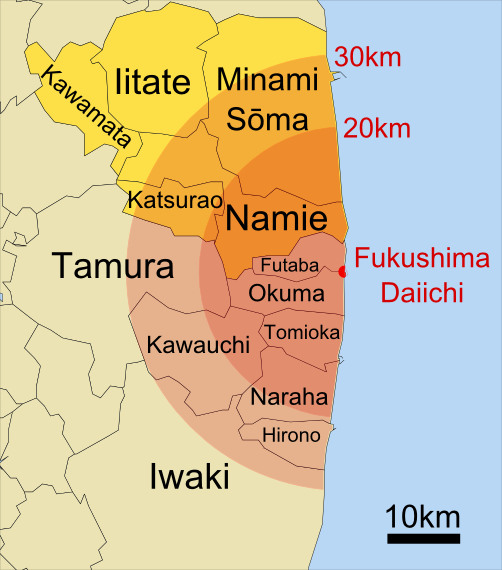“But Won’t Fusion Create the Energy We Need, Cleanly?”
It’s tempting to dream that fusion will save us. It’s the most common power source in the universe, including our Sun’s. Many believe it could produce power without radioactivity or greenhouse emissions and could be made safe.

Fukushima is a nuclear fission plant, not fusion, but have you ever wondered why it was built where a tsunami could hit it? The word tsunami comes from Japanese, so they knew it could happen and everyone knows Japanese engineering is world class. The nation of Hiroshima and Nagasaki knows more than any about the dangers of atomic energy.
They built it by the ocean for the reason all nuclear power plants are built near water, as are nearly all power plants of any sort and many factories. They need water for cooling the reactor. But the water doesn’t just cool the reactor. The reactor heats the water. All power plants and factories heat the environment. You might wonder, “do power plants and factories contribute to global warming?” Today, human industry’s collective contribution to heating the environment is measurable, but about one ten-thousandth that of greenhouse gases. But every time humans find or create new energy sources, we use it and grow. Even if we developed fusion to where it produced no radioactivity, had no risk of mechanical failure, no risk of terrorist attack, and had no other problems, it would still create heat and would motivate us to grow our economy. Growing the economy would help many people in many ways; that’s why we grow it, but it would produce heat.
At historically modest growth rates of 2.3 percent, if we decoupled the economy as much as possible from energy production, that negligible amount would grow exponentially. Within a human lifetime, waste heat from fusion reactors producing no other problems would contribute to global warming on the scale of today’s greenhouse effect. It makes sense that if you put a piece of the Sun within our atmosphere, it would heat it.
From another view, power plants and factories have long been placed near oceans and rivers to dump waste into them. Early in the Industrial Revolution, doing so was innocent and innocuous, but eventually we dumped mercury, PCBs, and more poisonous materials. In this sense, heat is dumped waste. We’ve stopped dumping many substances, but haven’t stopped dumping heat.
Beyond heat, any energy source, however clean, will accelerate the course of culture. We will cure more diseases and make planes faster and more efficient, but we will also mine more minerals, create more pollution elsewhere, and pollute and deplete more overall, as we have been doing for centuries. We will create more Einsteins and Mozarts; also more Hitlers and Maos. The problem with fusion isn’t if it doesn’t work; it’s if it does and we haven’t changed our culture. Likewise for artificial intelligence and gene splicing; all distractions from restoring the Golden Rule, stewardship, and common decency.
You might suggest we would stop growing before those results occurred, but if you believe we could stop growing then, it will be easier to stop growing now. The problem, again, is our culture. Technologies from the cotton gin to electric vehicles to fusion have and will exacerbate and accelerate our cultural outputs. Some are benign and desirable, but we don’t only grow the parts we like. Hydroelectric dams in the American southwest led to growing Phoenix, Las Vegas, and other cities dependent on power and water the dams can’t provide much longer. In the long term, they decreased resilience and increased scarcity. We grow all of our culture, including extinctions, dictators, deforestation, fentanyl, crack, Sacrifice Zones, and so on. If you want different result, first change our cultural values. Restore values of the Golden Rule, stewardship, and common decency, then technology will augment those values, though such a culture would probably innovate different technology less like fusion reactors and more like Amsterdam’s pedestrian and bike-friendly advances.
My background includes science, engineering, invention, entrepreneurship, patents, free trade, and personal growth resulting from economic growth. I love those things. I also recognize they are part of our culture. They augment all our values, not just some.
Imagine you could go back to talk to Eli Whitney, Robert Moses, or Norman Borlaug before they started. You might say “future generations value your ability to solve great problems, improve the economy, alleviate suffering, and attain great personal success, but if you do what you plan, you’ll achieve the opposite. If you do what you plan, it will for decades suggest certain numbers to track and by those numbers, your contribution will look great. But we know the pattern: underneath those numbers you will drive the system that caused the problems you want to solve. Future generations will lament your legacy and see you at best a tragic figure who didn’t mean to cause the suffering you unwittingly caused.” Borlaug saw this result in his lifetime. People who work with systems call it “overshoot and collapse.”
You might continue, “If you want to alleviate suffering and improve lives in the long run and create a matching legacy, focus on the systemic effects. Live your values yourself.”
Read my weekly newsletter

On initiative, leadership, the environment, and burpees